As soon as the pregnancy test shows positive, many questions arise. As a rule, they mainly relate to proper nutrition during pregnancy. From now on, to eat for two is not contemporary.
That a healthy diet is indispensable should be self-evident. Many vitamins and minerals are beneficial for the development of the embryo/unborn child.
Everything you eat during pregnancy will also be eaten by the growing offspring. Here you can make essential wrong because food can also have a harmful effect on the development and health.
Table of contents
Nutrition During Pregnancy – To Protect The Unborn Child
To understand why nutrition in pregnancy and the answer to the question “What should you not eat in pregnancy” are so important, the following is a short journey into human anatomy or body processes. In the first month of pregnancy, the placenta develops, with which the embryo is connected via the umbilical cord and supplied with oxygen and nutrients from the second month of pregnancy.
These reach the placenta via your bloodstream, where a continuous exchange of blood ensures a steady supply. This is like a filter system, where the ingredients of your blood are collected and passed on to the embryo/unborn baby.
From now on, you are feeding the embryo, which is why your diet is an important factor during pregnancy.
Why You Can’t Eat Everything During Pregnancy?
With a nutrient-rich diet you support your body positively and prevent deficiency symptoms. However, in addition to vital substances, harmful substances also pass through the placenta.
Alcohol and nicotine are the most known for possible developmental disorders and health damage to the unborn child.
Bacteria, on the other hand, which are ingested through food, are often ignored. Because your body is running at full speed, your immune system can be weakened, so that bacteria can reach the placenta more easily and reach the growing being.
This puts you at high risk for infection. Bacterial infections are often the cause of various pregnancy complications. In the worst cases, they can lead to severe disabilities, abortion(miscarriage) or stillbirth.
The expectant mother is at a greatly increased risk of food poisoning. To avoid this, it is strongly advised not to eat certain foods during pregnancy as soon as the pregnancy test shows positive.
Pregnancy Test Positive – Avoid High-risk Foods From Now On
While many foods are healthy for the unborn child and beneficial for pregnancy, high-risk foods can endanger the health of both mother and unborn child.
There’s a long what-not-to-eat-when-pregnant list of foods you should avoid – starting the moment you hold a pregnancy test positive in your hands.
Nutrition During Pregnancy – These Bacteria Endanger The Unborn Child
Even before the pregnancy test shows positive, certain bacteria that are often present in food can endanger the life of your growing baby and also yours.
The following types of bacteria are among those most likely to be ingested through food during pregnancy:
Toxoplasmosis Through Food In Pregnancy Can Be Fatal
Toxoplasmosis is a bacterial infectious disease caused by the bacterium “Toxoplasma gondii”. You can take this into your body and transmit the pathogen to your unborn child.
There is a particularly high risk of contracting toxoplasmosis if you eat meat that is not fully cooked. But the bacterium can also be present in cat feces or in a preliminary stage and can be transmitted to you on contact .
The consequences can be enormous. They range from damage to the central nervous system and the eyes of your baby to miscarriage or stillbirth. If the unborn child survives, the organic damage may not show up in the child for months or years.
Campylobacter And Salmonella Due To Improper Nutrition During Pregnancy
On the list of what not to eat during pregnancy, especially some animal products have not to be missing. Campylobacter, as well as Salmonella, are often found in animal products that have a high protein content.
In over 90 percent of all bacterial infections caused by food, these pathogens are responsible. In small quantities, the healthy, powerful body can resist the bacteria.
However, due to the changed physical situation during pregnancy, there is an increased risk of health consequences. There is an indirect risk to the unborn child because the mother’s illness can lead to a disturbance of the supply.
Diarrhea and vomiting deprive the body of water and valuable nutrients are lost.
Listeriosis
The bacterium Listeria (L.) monocytogenes enters your bloodstream if you eat infected food during pregnancy.
In many cases, the pathogen is found on foods that grow in the soil. There, infectious soil(s), sewage as well as compost manure ensures transmission to fruits, fruits and vegetables.
Often, the pathogen is also transmitted to humans through raw animal products. This happens when animals are fed spoiled silage, ingest the bacterium with it, and spread it through their milk or meat, for example.
In addition, the bacterium can stick to production machinery during the further processing of infectious animal products and in this way infect further foodstuffs.
If a food product possesses the bacterium, it survives and multiplies even at refrigerator and freezer temperatures down to around zero degrees Celsius. Here, there is a risk of spread even to raw products that have been heated or pasteurized for longer shelf life.
Listeriosis And Risk Of Confusion With Flu Infection
If you are infected with the bacterium, the first symptoms often appear weeks or months after the time of transmission.
These are similar to a flu-like infection. In unborn and newborn babies, the bacteria can cause serious illnesses and trigger premature birth or stillbirth during pregnancy.
Therefore, special care must be taken when handling food from the time the first pregnancy test is positive.
Too Much Vitamin A And E In The Diet Not Suitable For Pregnancy
Vitamins are of significant importance for the healthy development of the embryo, fetus, and unborn child. Above all, you need folic acid from the time when your pregnancy test is positive so that implantation is supported.
Afterwards, magnesium is very important as a mineral.
But too much of a good thing in some substances can harm your growing child. Vitamin C, D, and B are excreted in excess. Vitamins A and E, on the other hand, can cause side effects if taken in excess.
For the expectant mother, abdominal pain and premature rupture of the membranes are not uncommon due to too much vitamin E. The unborn child is also affected. It has a toxic effect on the unborn child, which can lead to consequences such as brain, nerve and general developmental damage.
Therefore, you should not eat foods with too much vitamin E during pregnancy.
Vitamin A promotes healthy growth of bones, teeth, hair, eyes, mucous membranes, nails, skin and body cells. It has a positive effect on blood circulation and the immune system.
Above all, vitamin A is essential for healthy cell formation in the unborn child. The requirement increases during pregnancy from 0.8 milligrams to 1.1 milligrams per day. As a rule, the body compensates for this automatically.
If additional vitamin A is consumed through the diet during pregnancy, the value can be greatly exceeded. This can cause growth disorders, changes in the skin, and liver and eye damage.
Yellow-orange vegetables are rich in provitamin A (beta-carotene). This is a vitamin A precursor. This is not to be confused with pure vitamin A, as it is processed by the body and is therefore harmless to your child.
Is Mozarella Cheese Allowed During Pregnancy?
While cheese as a fresh and raw product poses a risk of bacterial infection, the situation is different with mozarella during pregnancy. This is even recommended for nutrition during pregnancy.
The difference with fresh cheese and cheese made from raw products, lies in the processing. Mozzarella is made from pasteurized milk. This means that it is heated up to 100 degrees Celsius.
The bacteria do not survive this, which is why you can eat mozzarella during pregnancy. The condition is that the cheese is kept under high hygienic standards and is not bought as an open product in the cheese department.
An exception, besides mozzarella, in pregnancy are hard cheeses such as Emmental or Parmesan cheese. They have a low pH and high salt content. Listeria cannot survive in them.
Honey In Pregnancy Always A Questionable Topic
Honey has been the subject of criticism for years with regard to nutrition during pregnancy and for babies and young children. It is known that honey can transfer bacteria to the intestines of children.
But according to the Institute for Apiology Celle LAVES, this concerns babies up to 12 months.
For unborn babies, honey does not pose an increased risk, so you may eat it during pregnancy if it is stored/handled hygienically.
What Is Not Allowed To Eat During Pregnancy? The Overview
- Any form of raw meat, such as tartar or minced meat.
- Undercooked meat, such as English or medium well.
- Raw or undercooked poultry.
- Raw or undercooked fish, such as sushi.
- Offal, especially liver.
- Cold smoked or fermented animal meat and fish products.
- Seafood.
- Fresh cold cuts such as salami or raw ham.
- Raw milk.
- Too much whole milk to keep vitamin A intake low.
- Meat, cheese and fish foods with opened packaging if so-called high-risk foods are stored in the environment.
- Unwashed fruits and vegetables (raw food).
- Eggs, if they are not hard boiled.
- Too many eggs, so as not to consume too much vitamin A.
- Tiramisu and mousse au chocolate because of the eggs they contain.
- Fresh homemade mayonnaise.
- Raw cake batter.
- Ice cream.
- Spoiled dairy products and/or with expired shelf life dates.
- Openly sold fresh cheese.
- Pickled fresh cheese.
- Soft cheese, such as Camembert or Brie.
- Openly stored and sold mozzarella from counter sales.
- Spinach leaves due to high vitamin A content.
- Red peppers due to high vitamin A content.
- Nuts only in small quantities due to high vitamin E content.
- Butter only in small quantities due to high vitamin A content.
- Alcohol in any form – also in cakes and baked goods.
- Coffee and tea allowed in moderation.
- Foods with sugar substitutes, such as sorbitol or xylitol – can trigger contractions.
- Larger amounts of spices that can trigger contractions – these include curry, ginger, coriander, cloves, thyme and cinnamon.
Lack Of Hygiene
As soon as the pregnancy test shows positive, you should pay more attention to hygiene when handling food and preparing and storing it. Health-endangering bacteria get into your mouth through food, but also through infected hands, for example.
They can be transmitted through contaminated packaging as well as through unclean cutlery. The foods you should leave out of your pregnancy diet are only part of the risk.
You can only protect yourself and your unborn child from the above-mentioned health-endangering factors in the best possible way if you also pay meticulous attention to hygienic standards in the foods that you are allowed to eat during pregnancy.
You should follow these tips for your diet during pregnancy:
- Thoroughly clean raw vegetables and fruits before processing.
- Always wash your hands before preparing/cooking food and before eating it.
- Never use dirty dishes or cutlery.
- Regularly disinfect countertops and refrigerator.
- Store food only in sealed containers.
- Always pay attention to the expiration date.
Sources
https://www.sueddeutsche.de/gesundheit/ernaehrung-in-der-schwangerschaft-vorsicht-vitamine-1.3697569
http://www.bva.at/cdscontent/?contentid=10007.677101&viewmode=content
http://www.medizinfo.de/ernaehrung/schwanger/vitamin_a.shtml




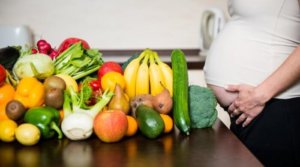
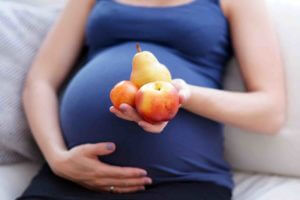
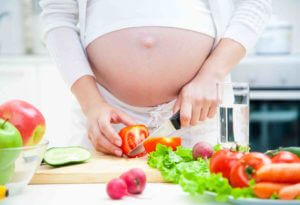
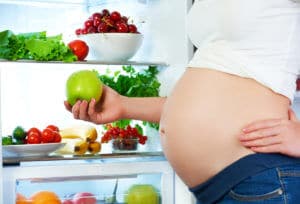
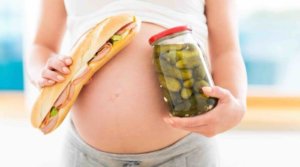
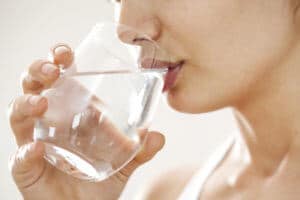

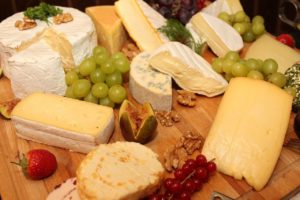
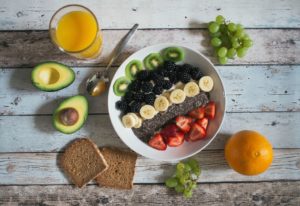
1 thought on “What Should You Not Eat During Pregnancy? Here You Can Find Out”